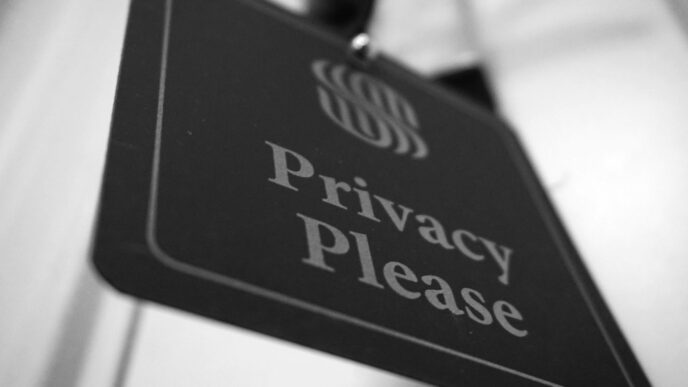Thinking about a career in privacy? It’s a field that’s really growing, and getting certified by the International Association of Privacy Professionals (IAPP) can make a big difference. These certifications show you know your stuff when it comes to protecting personal data, which companies really need these days. This article looks at how IAPP careers can lead to success in the privacy world.
Key Takeaways
- IAPP certifications are important for anyone wanting to succeed in privacy roles.
- Getting certified can make you stand out to employers and help you get better jobs.
- Privacy professionals play a big part in helping organizations follow data rules and build trust.
- Networking with other privacy pros is a smart way to grow your career and influence.
- A career in privacy is more than just a job; it’s about making a real difference in protecting people’s information.
Understanding IAPP Careers And Certifications

The Role Of IAPP In Privacy Professional Success
The International Association of Privacy Professionals, or IAPP, is basically the go-to place if you’re serious about a career in data privacy. Think of them as the folks who set the standards and provide the training for people who deal with protecting personal information. They’re not just handing out certificates; they’re building a whole community and a recognized path for professionals in this field. Getting certified by the IAPP shows employers you know your stuff when it comes to privacy laws and practices. It’s like getting a stamp of approval that says you’ve put in the work to understand a really complex and important area.
Key IAPP Certifications For Career Growth
When you’re looking at IAPP certifications, a few stand out as really popular and useful. The big one is the Certified Information Privacy Professional, or CIPP. This one is super important because privacy laws aren’t the same everywhere. So, you have to pick a region. The CIPP/US is for the United States, and the CIPP/E is for Europe, focusing on things like GDPR. There’s also the Certified Information Privacy Technologist (CIPT), which is more about the tech side of keeping data safe.
Here’s a quick look at some main ones:
- CIPP (Certified Information Privacy Professional): Covers privacy laws, regulations, and risk management. You’ll need to choose a regional focus (like US or Europe).
- CIPT (Certified Information Privacy Technologist): Focuses on the technical aspects of privacy, like data security and privacy-enhancing technologies.
- CIPM (Certified Information Privacy Manager): This one is about managing a privacy program within an organization.
Navigating The IAPP Certification Landscape
So, how do you pick the right certification? It really depends on what you want to do. If you’re working with data in the US, the CIPP/US makes a lot of sense. If your company deals with European customers, then CIPP/E is probably the way to go. The IAPP provides study materials and practice exams, which are pretty helpful. You usually have to be a member of the IAPP or pay a fee to keep your certification active, which makes sense because privacy rules change all the time. It’s not a one-and-done thing; you have to keep up.
The Strategic Advantage Of Privacy Certification
Getting a privacy certification, like those offered by IAPP, really does give you a leg up in your career. It’s not just a piece of paper; it’s a clear signal to employers and colleagues that you know your stuff when it comes to data protection. Think of it as a stamp of approval that says you’ve put in the work to understand the complex rules and ethical considerations surrounding personal information.
Elevating Professional Credibility and Trust
When you’re certified, people tend to trust your judgment more. In a field where mistakes can lead to big problems, having that validated knowledge makes you a go-to person. It means you can confidently advise on how to handle data properly, which in turn helps the whole organization avoid trouble. This credibility is gold, especially when dealing with sensitive information or navigating tricky legal waters. It builds confidence not just with your team, but with clients and even regulators.
Gaining A Competitive Edge In The Job Market
Let’s be real, the job market for privacy professionals is getting crowded. Having an IAPP certification on your resume makes you stand out. Companies are actively looking for people who can demonstrate their privacy skills, and certification is a straightforward way to do that. It shows you’re serious about the field and have a solid grasp of the principles and practices needed to keep data safe and compliant.
Here’s a quick look at why it matters:
- Demonstrates Knowledge: You’ve passed tests proving you understand privacy laws and best practices.
- Signals Commitment: It shows you’re dedicated to a career in privacy.
- Opens Doors: Many job descriptions specifically ask for or prefer certified candidates.
- Boosts Salary Potential: Certified professionals often command higher salaries.
Driving Organizational Privacy Initiatives
Certified privacy pros aren’t just about individual gain; they’re key to making organizations better at privacy. You can take the knowledge you’ve gained and help build or improve privacy programs from the ground up. This means:
- Developing Clear Policies: Helping to write and implement rules that everyone can understand and follow.
- Conducting Risk Assessments: Identifying potential privacy problems before they happen.
- Training Staff: Educating colleagues on why privacy matters and how to protect data in their daily work.
By doing these things, you help your organization avoid fines, build trust with customers, and operate more ethically in a world that’s increasingly concerned about data privacy.
Career Paths For IAPP Certified Professionals
So, you’ve got your IAPP certification, maybe the CIPP/US or CIPP/E, and you’re wondering, ‘Now what?’ Well, good news! That piece of paper, or rather, that digital badge, actually opens up a bunch of doors. It’s not just about knowing the rules; it’s about being able to put that knowledge to work in real-world jobs.
Data Protection Officer Roles
This is probably one of the most direct paths. A Data Protection Officer, or DPO, is basically the go-to person for privacy within an organization. They’re responsible for making sure the company follows all the privacy laws, like GDPR or CCPA. It’s a big job, involving everything from checking how data is collected and stored to handling any data breaches that might happen. You’ll be working closely with different departments, advising them on privacy matters, and generally keeping the company out of trouble. It’s a role that requires a solid grasp of both the legal side and the practicalities of data handling.
Privacy Consultancy Opportunities
Think of yourself as a privacy troubleshooter. Companies, especially smaller ones or those new to dealing with lots of personal data, often need outside help. They hire privacy consultants to come in, look at their systems, policies, and practices, and tell them what needs to change to be compliant. You might be developing privacy policies, training staff, or helping them figure out how to handle data requests from customers. It’s a chance to work with different businesses and tackle a variety of privacy challenges.
Compliance Specialist Positions
This path is all about making sure things are done by the book. As a Compliance Specialist, you’ll be focused on ensuring that an organization’s data practices line up with privacy regulations. This could involve auditing systems, creating documentation, and working with internal teams to implement new procedures. You’re the one who helps build and maintain the framework that keeps the company on the right side of the law when it comes to personal information. It’s detailed work, but super important for building trust with customers and avoiding hefty fines.
Practical Application Of Privacy Knowledge
So, you’ve got the certifications, you understand the theory, but what does it actually look like when you’re on the job? This is where the rubber meets the road, so to speak. It’s not just about knowing the rules; it’s about making them work in the real world, day in and day out. Think about it: companies are collecting more data than ever before, and keeping track of it all, making sure it’s handled right, and protecting it from bad actors is a huge task.
Implementing Robust Privacy Programs
This is the big one. A privacy program isn’t just a document; it’s a living, breathing system. It involves setting up clear policies that everyone in the company can understand, not just the legal team. Then, you need to train people. Seriously, a lot of privacy mishaps happen because someone just didn’t know any better. You’ll be figuring out how to collect data responsibly, making sure you’re not grabbing more than you need, and deciding how long you’ll keep it. It’s about building a framework that guides how personal information is treated from the moment it’s collected until it’s securely disposed of. This means:
- Defining data collection limits: Only gather what’s absolutely necessary for the stated purpose.
- Establishing data retention schedules: Decide how long different types of data will be kept before being deleted.
- Creating incident response plans: What happens when something goes wrong? Who gets notified, and what steps are taken?
- Conducting regular audits: Checking to see if the program is actually being followed and if it’s still effective.
The goal is to make privacy a normal part of how the business operates, not an afterthought. It’s about embedding these practices so deeply that they become second nature.
Strengthening Data Governance Frameworks
Data governance is like the organizational chart for your data. It defines who is responsible for what, what the rules are, and how decisions about data are made. For privacy professionals, this means ensuring that the governance structure specifically addresses personal information. You’ll be working to make sure that data is accurate, complete, and, most importantly, handled in line with privacy principles. This often involves setting up clear roles and responsibilities, like appointing data stewards who are accountable for specific datasets. It also means having processes in place for data quality checks and managing access controls so only authorized individuals can see sensitive information. Think of it as building a strong foundation so that all the privacy initiatives have a solid structure to stand on. It’s about making sure that data isn’t just floating around aimlessly but is managed with purpose and care, aligning with privacy regulations and company policies.
Building a Culture of Privacy and Trust
Ultimately, privacy isn’t just about rules and systems; it’s about people. You can have the best policies in the world, but if employees don’t buy into the importance of privacy, they won’t be effective. This part of the job is about influencing behavior and fostering a mindset where protecting personal information is seen as a shared responsibility. It involves clear communication, consistent messaging from leadership, and making privacy relatable to everyone’s role. When people understand why privacy matters – not just that it’s a rule – they’re more likely to act accordingly. This builds trust, not only internally among colleagues but externally with customers and partners. A strong privacy culture means that privacy considerations are part of everyday conversations and decision-making, leading to fewer mistakes and a better reputation for the organization.
Expanding Your Network And Influence

Look, getting certified is a big step, but it’s not the finish line. To really make a mark in the privacy world, you’ve got to connect with other people in the field. It’s like anything else, really – knowing the right folks can open doors you didn’t even know existed.
Leveraging IAPP Communities For Growth
The International Association of Privacy Professionals (IAPP) isn’t just about the exams and the certificates. They have these local chapters and online forums where privacy pros hang out. It’s a good place to ask questions when you’re stuck on something, or even just to hear what challenges others are facing. Seriously, these communities are goldmines of practical advice. You can learn about new regulations before they really hit the news or find out how another company solved a tricky data mapping problem. It’s way better than trying to figure everything out on your own.
Becoming A Thought Leader In Privacy
Once you’ve been around for a bit and gained some experience, you might start thinking about sharing what you know. This doesn’t mean you need to write a book or anything. It could be as simple as posting an insightful comment on a LinkedIn discussion, speaking at a local IAPP meet-up, or even just helping out a junior colleague. When you consistently share good information and show you understand the nuances of privacy, people start to see you as someone who really knows their stuff. This builds your reputation, not just within your company, but in the wider privacy community.
Mentorship And Partnership Opportunities
Think about it: who better to learn from than someone who’s already been where you want to go? Actively participating in these networks often leads to finding mentors. These are people who can offer guidance, share their career journey, and give you a heads-up on opportunities. On the flip side, you might also find people you want to partner with on projects, whether it’s developing a new privacy training module or collaborating on a research paper. These relationships are built on mutual respect and shared goals, and they can be incredibly rewarding both personally and professionally.
Cultivating A Purpose-Driven Career In Privacy
The Societal Impact Of Privacy Professionals
Look, working in privacy isn’t just about ticking boxes or avoiding fines. It’s actually about something bigger. You’re on the front lines, protecting people’s personal information in a world that’s constantly collecting it. Think about it: every time you help an organization build a better privacy program, you’re contributing to individual autonomy and trust. It’s about making sure people have control over their own data, which is a pretty big deal these days. This work has a real impact on society, helping to keep digital spaces safer and more ethical for everyone. It’s a field where you can genuinely make a difference.
Achieving Long-Term Career Fulfillment
When you’re driven by purpose, the day-to-day work just feels more meaningful. Privacy professionals get to solve complex problems, often at the intersection of technology, law, and ethics. This constant challenge keeps things interesting and prevents burnout. Plus, seeing the positive outcomes of your work – like a stronger, more trusted organization or individuals feeling more secure about their data – brings a deep sense of accomplishment. It’s not just a job; it’s a career where you can build something lasting and feel good about what you do.
Embracing Continuous Learning In Privacy
The privacy landscape is always changing. New technologies pop up, laws get updated, and people’s expectations shift. Because of this, you can’t just get certified and call it a day. You have to keep learning. This means staying on top of new regulations, understanding emerging tech like AI and its privacy implications, and even learning from your peers. It might sound like a lot, but honestly, it’s what makes a career in privacy so dynamic. It keeps your skills sharp and ensures you’re always providing the best advice. Think of it as an ongoing adventure in staying ahead of the curve.
Wrapping Up Your Privacy Journey
So, you’ve looked into what it takes to get certified and the kinds of jobs out there. It’s clear that getting a privacy certification, like those from IAPP, is a solid move for your career. It’s not just about passing a test; it’s about really getting how data protection works and why it matters. This knowledge helps you do your job better, whether you’re advising a company, managing data, or making sure rules are followed. Plus, having that certification on your resume really makes you stand out to employers. It shows you’re serious about privacy and ready for the challenges. Keep learning, stay curious, and you’ll be well on your way to a successful career in this important field.
Frequently Asked Questions
What is IAPP and why is it important for privacy jobs?
IAPP stands for the International Association of Privacy Professionals. It’s like a big club for people who work with keeping information safe and private. Getting certified by IAPP shows employers you know a lot about privacy rules and how to protect people’s data. This makes you a more attractive candidate for jobs in this field.
What are some popular IAPP certifications?
Some of the most popular ones are the CIPP (Certified Information Privacy Professional) which has different versions for different regions like the US or Europe, and the CIPT (Certified Information Privacy Technologist) which focuses on the tech side of privacy. These show you have special skills in privacy.
How does having an IAPP certification help my career?
Having an IAPP certification can really boost your career. It makes you stand out to employers, often leads to higher pay, and opens up more job opportunities. It’s like having a special badge that says you’re an expert in privacy.
What kind of jobs can I get with an IAPP certification?
You can get jobs like a Data Protection Officer, who makes sure a company follows privacy laws, or a Privacy Consultant, who advises companies on how to handle data correctly. You could also work as a Compliance Specialist, making sure everything is up to code.
Is it hard to get an IAPP certification?
It can be challenging because you need to study a lot about privacy laws and how they work in real life. But with good study habits, practice tests, and maybe joining study groups, it’s definitely achievable. Many people find it very rewarding.
What’s the best way to prepare for an IAPP certification exam?
The best way is to use the study materials provided by IAPP, take practice exams to see where you need more work, and understand how the laws apply to real-world situations. Staying updated on privacy news is also super important because the rules change.














